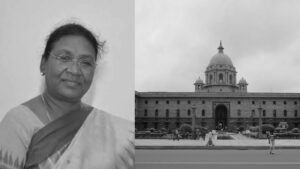Table of Contents
INTRODUCTION
The President of the Republic of India is the head of the Indian state and commander in chief of all the Indian Armed Forces. The President of India is indirectly elected by the directly elected members of both the Rajya Sabha and Lok Sabha, and the legislative assemblies of the states and union territories of India. The President of India has been granted the responsibility and authority to protect the Constitution
As we refer to the Indian Constitution according to Article 52, the president is the head of state and the Parliament. Moreover, according to Article 52 the President is also described as the first citizen of India.

How is President elected?
There is no direct election for the Indian President. An electoral college elects him. The electoral college responsible for President’s elections comprises elected members of:
- Lok Sabha and Rajya sabha
- Legislative Assemblies of the states
- Legislative Assemblies of the Union Territories of Delhi and Puducherry
What is the term of the President’s office?
Once President is elected, he holds office for five years. He sits in office even after the completion of five years given no new election has taken place or no new President has been elected till then. He can also be re-elected and there is no cap on his re-election.
What are the qualifications of the President?
A candidate has to meet some qualifications to be elected as president. The qualifications of the President are:
- He should be an Indian Citizen
- His age should be a minimum of 35 years
- He should qualify for the conditions to be elected as a member of the Lok Sabha
- He should not hold any office of profit under the central government, state government, or any public authority
What are the conditions of the President’s office?
There are a few conditions for the candidate running for the President’s elections:
- He cannot be a member of Lok Sabha and Rajya Sabha. If he has been a member of either of the house, he should vacate the seat on his first day as President in the office
- He should not hold any office of profit
- For his residence, Rashtrapati Bhavan is provided to him without the payment of rent
- Parliament decides his emoluments, allowances, and privileges
- Parliament cannot diminish his emoluments and allowances during his term of office
- He is given immunity from any criminal proceedings, even in respect of his personal acts
- Arrest or imprisonment of the President cannot take place. Only civil proceedings can be initiated for his personal acts that too after giving two months of prior notice.
What are the powers and functions of the President of India?
The President of India has been granted the responsibility and authority to protect the Constitution.
- Executive Powers of the President
- Legislative Powers of the President
- Financial Powers of the President
- Judicial Powers of the President
- Diplomatic Powers of the President
- Military Powers of the President
- Emergency Powers of the President
Executive Powers of the President
- The President has the power and responsibility to appoint the Prime Minister of India.
- The President of India appoints the Chief Justice.
- The President is the appointing authority for the states and also has the power to dismiss a governor who has violated the constitution in their acts.
- Other than the posts mentioned above, the President has the power to appoint on a number of posts including, Ambassadors to other countries like, IAS, IPS, IFS, Attorney General, etcetera.
Legislative Powers of the President
- The President has the power to dissolve the Lok Sabha.
- A bill that has been passed by both the houses of the parliament can become a law only if it receives the president. (subject to limitations)
- The President of India has the power to nominate 12 members to the Rajya Sabha who have made extraordinary accomplishments in the fields of science, art, literature and social service.
- The President has the power to send a bill back to the parliament unless it is a money bill or constitutional amendment bill.
Financial Powers of the President
- To introduce the money bill his prior recommendation is a must
- He causes Union Budget to be laid before the Parliament
- To make a demand for grants, his recommendation is a pre-requisite
- The contingency Fund of India is under his control
- He constitutes the Finance Commission every five years
Judicial Powers of the President
- Appointment of Chief Justice and Supreme Court/High Court Judges are on him
- He takes advice from the Supreme Court, however, the advice is not binding on him
- Under article 72, he has been conferred with the power to grant pardon against punishment for an offense against union law, punishment by a martial court, or death sentence.
Diplomatic Powers of the President
- International Treaties and agreements that are approved by the Parliament are negotiated and concluded in his name
- He is the representative of India in international forums and affairs
Military Powers of the President
He is the commander of the defense forces of India. He appoints:
- Chief of the Army
- Chief of the Navy
- Chief of the Air Force
Emergency Powers of the President
He deals with three types of emergencies given in the Indian Constitution:
- National Emergency (Article 352)
- President’s Rule (Articles 356 & 365)
- Financial Emergency (Article 360)
What is the Ordinance Making Power of the President?
Article 123 deals with the ordinance-making power of the President. The President has many legislative powers and this power is one of them. He promulgates an ordinance on the recommendation of the union cabinet.
MUST READ
Difference Among Article, Section, Rules & Regulation.
TYPES OF LAW IN THE INDIAN JUDICIAL SYSTEM
NEW RULES OF DRIVING LICENSE, 2022
